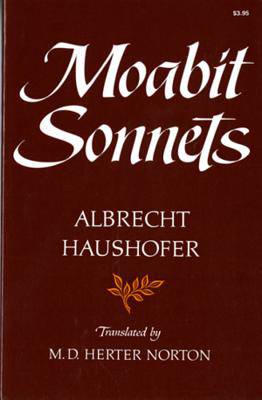
- Afhalen na 1 uur in een winkel met voorraad
- Gratis thuislevering in België vanaf € 30
- Ruim aanbod met 7 miljoen producten
- Afhalen na 1 uur in een winkel met voorraad
- Gratis thuislevering in België vanaf € 30
- Ruim aanbod met 7 miljoen producten
Zoeken
Omschrijving
Just before Christmas 1944, Albrecht Haushofer had been delivered to the Gestapo prison in the Moabit district of Berlin. In solitary confinement, fettered hand and foot, he awaited a show trial with a predetermined outcome. After a while he was allowed some sheets of paper and a pencil. He began to write sonnet after sonnet describing his days and nights in prison, shared with comrades of the Resistance who were one after another taken away to the hangman. From Moabit his mind soared out to the world he had known and loved: the lands near and far he had visited, the men and women who meant most to him, the literary and artistic treasures of the past he valued most of all. Sometimes he wrote in sorrow over the destruction of this precious heritage, sometimes in anger against those who had led his people on the road to war. But mostly he wrote in praise and love, as he conversed with the dead and the living dearest to him.
Specificaties
Betrokkenen
- Auteur(s):
- Vertaler(s):
- Uitgeverij:
Inhoud
- Aantal bladzijden:
- 216
- Taal:
- Engels
Eigenschappen
- Productcode (EAN):
- 9780393045321
- Verschijningsdatum:
- 1/11/1978
- Uitvoering:
- Paperback
- Formaat:
- Trade paperback (VS)
- Afmetingen:
- 136 mm x 210 mm
- Gewicht:
- 285 g

Alleen bij Standaard Boekhandel
+ 59 punten op je klantenkaart van Standaard Boekhandel
Beoordelingen
We publiceren alleen reviews die voldoen aan de voorwaarden voor reviews. Bekijk onze voorwaarden voor reviews.











